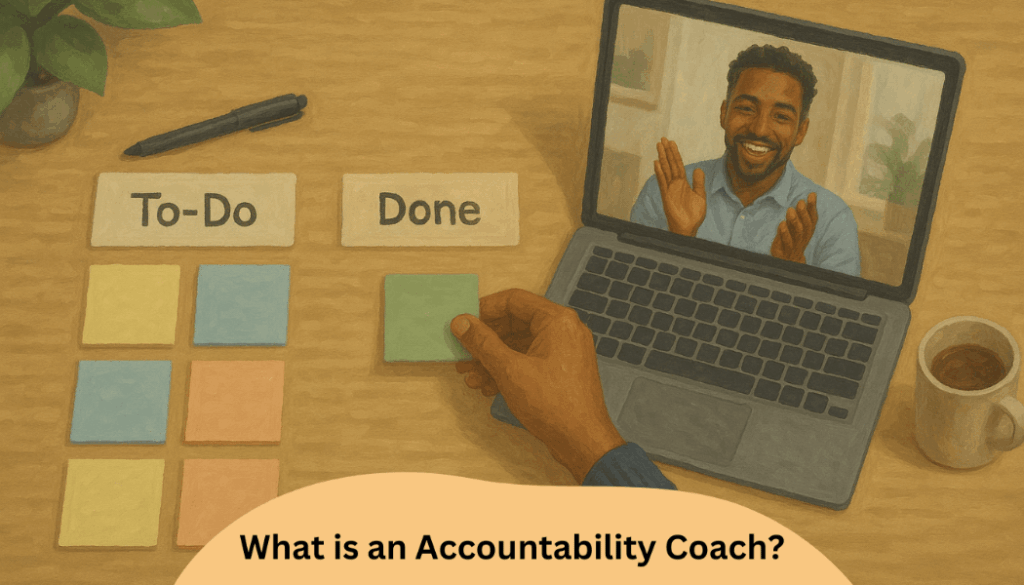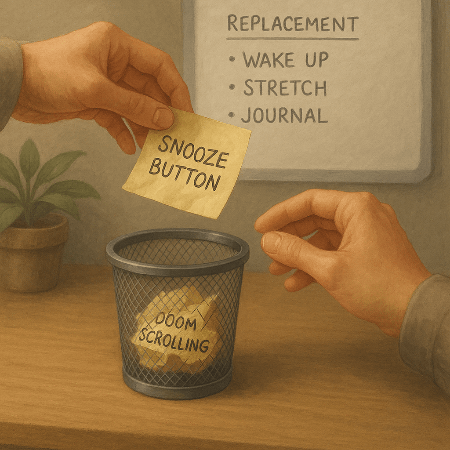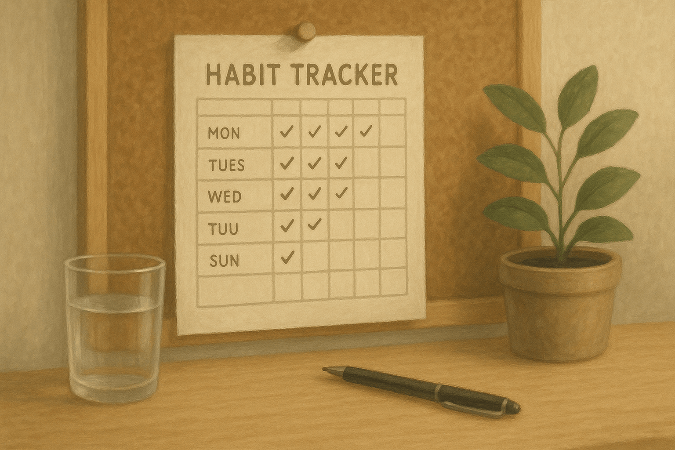Ever told yourself, “This is the week I finally do it!” and then… crickets? Lots of us have been there.
Because motivation is a fleeting companion—it shows up unannounced and leaves without warning.
Turning good intentions into real progress is harder than we like to admit, and most goals need more than just a to-do list—they need someone in your corner.
Finally Finish What You Start
You don’t need more information. You need the accountability to execute.

That’s where an accountability coach comes in — part motivator, part strategist, and part reality check.
So, what is an accountability coach, really? Let’s break it down and see if this could be the missing piece for your own personal and professional development.

Let’s Start with What an Accountability Coach Actually Is
You might have heard the term before—but what does an accountability coach actually do?
Think of them as your personal GPS for progress. They’re not just shouting from the passenger seat; they’re right beside you, holding the map, making sure you actually follow the route.
Defining Accountability Coaching
Let’s pull back the curtain on what “accountability coaching” truly means. Hint: it’s a whole lot deeper than getting reminders on your phone.
What Makes Accountability Coaching Different from Other Coaching?
This is a fair question — especially if you’ve heard of all the types of coaches out there in the coaching industry.
Life coaches, business coaches, executive coaches…the list goes on. But what is an accountability coach, specifically?
- Focus on follow-through: While other coaches can help you define your purpose or fine-tune your vision, an accountability coach zeros in on making sure you actually do what you said you would do. They hold clients accountable.
- Structured check-ins: They set regular, “stuff-getting-done” sessions. You report your wins, your “oops” moments, and where you need a nudge.
- Action-oriented: It’s less about grand theory and more about real-world results. Tasks. Timeframes. Deadlines. Progress.
- Goal ownership: You set the goals. They help you own them — and adjust when you go off-track.
The Real Role of an Accountability Coach (It’s More Than You Think)
A lot of people picture an accountability coach as some sort of motivational referee — blowing the whistle when you skip a task. Sure, you get a bit of that tough love. But there’s a lot more going on:
- Clarity: They help you chop massive goals into step-by-step action plans you can actually tackle.
- Mindset shift: Stuck in a pattern of self-sabotage, procrastination, or negative self-talk? Your coach helps you spot those patterns and flip the script.
- Support and feedback: Not just “Did you do the thing or not?” Real coaching involves unpacking WHY you got stuck and identifying potential obstacles so you can find a better way forward.
- Celebration: Wins (big or small) get recognized, so you build real momentum — not just a never-ending to-do list.
So if you’re still asking, “What is an accountability coach?”, keep this in mind: they’re your progress partner, not your boss.
Who Benefits Most from Accountability Coaching?
So who gets the most out of this coaching expertise? It’s not just CEOs or marathon runners. If you’ve ever set a goal you truly cared about — and struggled to get there — it’s for you.
Who’s This For? The People Who Need an Accountability Coach
Here’s a quick rundown of who tends to thrive with accountability coaching:
- Procrastinators and perfectionists: If you “wait for the perfect time,” only to watch deadlines whiz by, you’ll love having someone keep you on track.
- Big-dreamers who stall: Great at planning but not so great at finishing strong? Yep, accountability coaching is for you.
- Overwhelmed multi-taskers: If you juggle a million things and feel like none are moving forward, a coach helps you prioritize so you can execute and find work life balance.
- Entrepreneurs and leaders: Even high performers benefit from outside perspective and added accountability.
- Anyone craving positive change: Whether it’s health, habits, side projects, or life pivots, accountability isn’t just a “work” thing.
And if you’re reading this and wondering if an accountability coach is for someone like you… well, it’s for anyone who doesn’t want to stay stuck.
Why Going It Alone Often Leads to Stalling Out
Let’s get real for a second. Most people think willpower is all they need to crush their goals. Except — life happens, motivation dips, and Netflix keeps releasing new series.
Without accountability:
- You’re more likely to let yourself off the hook.
- Excuses start sounding super reasonable.
- Setbacks feel heavier when you face them alone.
- Progress becomes an “if” instead of a “when.”
There’s solid research showing that when you regularly report your progress to someone else, your chance of success can jump by up to 95%.
That’s not magic — it’s the power staying focused, regular check ins and not letting yourself off the hook so easily.

How Accountability Coaching Works
Ready for a peek behind the curtain? Let’s break down the nuts and bolts of how accountability coaching gets results (and what to expect if you choose to join the coaching program and get support with your goals).
How Does This Coaching Thing Actually Work?
Alright, so what is an accountability coach actually doing with you each session?
- Setting achievable goals: You and your coach nail down exactly what you want to achieve, from giant ambitions to micro-habits.
- Action planning: Together, you translate big goals into specific tasks and deadlines — so you never guess what step is next.
- Regular check-ins: Sessions could be weekly, bi-weekly, or even daily (for deep-divers). You update your coach and discuss progress. They give honest feedback, continuous support, and adjust strategies as needed.
- Troubleshooting: If you hit a wall, your coach helps you figure out what’s stopping you — and how to stay focused and overcome obstacles.
- Celebrating wins: Progress tracking gets spotlighted! Tiny victories are fuel for big momentum.
Tools and Tricks Accountability Coaches Use to Keep You on Track
Every coach has their own style, but here are some tried-and-true tools that make a significant difference:
- Progress trackers: You might use customized dashboards, spreadsheets, or even a simple note app to log habits and wins.
- Accountability contracts: Some coaches use written agreements (sounds super-official, but it works!) so you’re not just “hoping” to behave — you’ve made a commitment to your goal setting.
- Text/email reminders: Friendly nudges to keep you going between sessions.
- Goal visualization: Coaches often use vision boards or guided imagery to keep your “why” front and center.
- Reflection prompts: Journaling questions or end-of-week reviews help you process lessons and on the path for long term success.
Teamwork Makes the Dream Work: Coach + Client Partnership
If you’re picturing your accountability coach as a drill sergeant, think again. The value in individual coaching comes from partnership.
Your coach isn’t there to judge you. Their job is to provide support and keep things solution-focused, always respecting your journey.
It’s a collaborative process—you co-create actionable plans and strategies that actually fit your needs. There are zero cookie-cutter approaches here.
And when life throws a curveball, your coach helps you develop a growth mindset. Instead of stewing in guilt, you learn from the experience and adjust to overcome obstacles.
Every win gets celebrated as a shared success. Trust me, your coach will be almost as excited about your progress as you are.

Key Benefits of Accountability Coaching
Let’s shift gears from “What is an accountability coach?” and get into the why it matters. Here’s where things get seriously exciting.
How Accountability Coaching Pumps Up Your Motivation
Ever have days when you just don’t feel like doing the work? Same here. The difference with a coach is, you’re not alone on those tough days.
- Accountability builds momentum: When you know someone is checking in, you’re more motivated to push through dips in energy.
- Consistent encouragement: Your coach becomes a source of positive reinforcement that keeps your spark going.
- Reduced excuses: It’s harder to bail on your goal setting when you’ll be discussing those choices openly — not just rationalizing them in your head.
Turning Goals into Habits: Staying Consistent Without Burning Out
Transforming sporadic action into long-term habits is where accountability coaching truly shines.
Your coach helps you break down those big goals into clear, bite-sized steps. No more “I’ll write my book someday”—now it’s “I’ll write two pages by Thursday.”
They also help you set up a gentle structure. The right balance keeps you moving forward without all the burnout that comes from piling on too much pressure.
And during the journey, you’ll regularly look at what’s working (and what isn’t), making it easier to adjust as you go. Consistent feedback means you’re always learning and building momentum, one habit at a time.
If you’re into the psychology of habit change, you might like James Clear’s guide on how to make habits stick.
Kicking Procrastination and Distractions to the Curb
Procrastination? Distraction? We all know the struggle. Well, your coach won’t let you off the hook (in a good way).
First, you’ll have honest discussions about why you’re putting things off. It’s not just about asking, “Did you do it?”—it’s about digging into what’s holding you back.
And if you do get off track, you won’t wait weeks to correct course. Your next session is a chance for a real-time reset, so you can bounce back quickly.
And when it comes to distractions, your coach will help you find and stick with strategies that actually work.
Building Confidence and Shifting Your Mindset for Success
Here’s a secret most people miss: The biggest transformation often isn’t your results — it’s what happens in your head.
- Confidence grows: Meeting your commitments consistently changes how you see yourself.
- Growth mindset: You’ll learn to view setbacks as feedback, not failure.
- Self-trust: As you follow through, your ability to set and crush future goals levels up, too.

Common Misconceptions About Accountability Coaching
Let’s knock out a few myths that might be lurking in your head — or that you’ve heard from critics who think “accountability” just means being bossed around.
Myth Busting: It’s Not Just Nagging
Some people hear “accountability coach” and think it’s adult babysitting. Far from it! The best coaches don’t nag endlessly — they partner with you. They’re not there to harass you into doing chores.
Nope, You Don’t Have to Do It All Alone
“If you need a coach, you’re weak.” Ever heard that one? Total myth. In fact, inviting support is a sign of self-awareness and grit. Even elite athletes and executives — people at the top of their game — work with coaches to keep growing.
Forbes explains why accountability is a success multiplier for high achievers.
Why Accountability Coaching Is So Much More Than Reminders
Reminders are helpful, but real accountability coaching goes way deeper:
- It’s about tailored strategies, not just checklist reminders.
- You get reflective questions, honest feedback, and resourceful troubleshooting.
- It’s a two-way conversation, not a robot chirping “Don’t forget!”
So next time someone asks you, “What is an accountability coach — just someone to bug you?” you’ll know the answer is, “Nope. So much more.”
How to Choose the Right Accountability Coach
So you’re curious to work with a coach. Awesome — but don’t just Google “accountability coach near me” and pick the first result. Here’s how to find one who’s the perfect fit.
What to Look for So You Don’t Waste Time or Money
- Experience and Reviews: Look for someone with relevant experience and great testimonials.
- Philosophy: Find out how they approach coaching. Do they co-create plans with clients? Are they flexible to your style?
- Track record: Real results, not just catchy slogans. Ask for example wins.
- Commitment: A coach should be as invested in your progress as you are.
You want to work with someone who honestly cares about your success — not just logging billable hours.
Smart Questions to Ask Before You Commit
- “What is your coaching style? How do you normally structure sessions?”
- “Can you share some client success stories or case studies from your coaching practice?”
- “How do you handle setbacks or tough weeks?”
- “What’s your process if a client gets off track or loses motivation?”
- “Do you have a free discovery session or trial?”
The answers will tell you if their vibe matches yours.
Spotting the Coach That’s Actually a Great Fit
Here’s the important thing: chemistry matters. Even the most credentialed coach won’t help much if you dread your calls.
- Trust your gut: Do you feel comfortable and supported?
- Communication clarity: Are they clear and responsive?
- Customization: Do they adapt to your personality, needs, and schedule?
- Shared excitement: When you mention your goals, do they light up, too?
At the end of the day, what is an accountability coach without trust or rapport? Not much.

Getting Started: What to Expect
Feeling that “maybe this is for me” spark? Before you jump in, let’s demystify what happens on Day One (and beyond).
Here’s What Happens in Your First Coaching Session
- Intro chat: You’ll discuss your background, current challenges, and big-picture goals.
- Clarify your “why”: Your coach helps you unearth your true motivation for change with constructive feedback.
- Goal mapping: You’ll translate your vision into 1-2 clear priorities.
- First steps: You’ll leave with concrete, doable action steps to tackle before your next session.
- Zero judgment: It’s all about getting started and maintaining consistent effort— not performing perfectly.
How to Get the Most Out of Your Coaching Journey
Show up honestly. Don’t sugarcoat the setbacks—honesty fuels real solutions and helps your coach support you better.
Track your progress along the way. Whether it’s an app, a spreadsheet, or good old-fashioned sticky notes, use whatever tools your coach offers so nothing falls through the cracks.
Ask for what you need. If you’re craving more support or ready for an extra challenge, speak up—your coach is there to adapt.
Keeping Your Expectations Real (And Your Motivation High)
It’s easy to think a coach will “fix” everything fast. But you’re still the one steering the ship. A coach provides strategy, support, and accountability — but you put in the reps.
- Growth takes time. Expect steady, not instant, progress.
- Ups and downs are normal. Highs and lows are part of the ride.
- Your journey is unique. Comparison is the thief of progress. Focus on your on journey.
Stick with it—real change comes from showing up for yourself, one step at a time.
DIY Accountability Tips for Beginners
Maybe you’re intrigued, but not quite ready for a full coaching partnership. Here’s how to start building accountability muscles on your own.
Easy Ways to Hold Yourself Accountable Right Now
- Set deadlines: Put them in your calendar like non-negotiable appointments.
- Track progress visually: Whether it’s a wall chart, a spreadsheet, or an app, visuals make progress real.
- Reward yourself: Small incentives for completed actions can jumpstart motivation.
How to Know When It’s Time to Bring in a Pro
You can get a long way solo, but sometimes you need that extra boost. Consider hiring a coach if:
- You set the same goals over and over (with little progress).
- You get stuck in planning mode without follow-through.
- Motivation crashes after the first week or two.
- You’re ready to invest in your growth (and stop stalling out).
If you keep searching “What is an accountability coach” because you suspect that’s your next step… it probably is!

Why Accountability Coaching Might Be Your Secret Weapon
By now, you’re clear on what is an accountability coach. They’re part motivator, part strategist, and part partner-in-success.
But most importantly, they’re all about helping you become who you actually want to be — not just who you think you “should” be.
If you’re tired of spinning your wheels, beating yourself up for failed resolutions, and need some constructive feedback… it’s time to consider accountability coaching.
Ready to Take Action? Here Are Your Next Steps
- Reflect: What would you tackle first if you knew someone supportive had your back?
- Research coaches: Browse a few, book a clarity call, and get a feel for their energy.
- Ask about fit: Remember, great accountability coaching is a partnership. Chemistry matters.
- Test run: Many coaches offer a free or discounted first coaching session so you can see if it clicks.
Book a Coaching Call or Grab a Helpful Resource to Get Started
So what is an accountability coach in your story? Maybe, just maybe, it could be the edge you’ve been missing. Why not take the next step?
- Give yourself the gift of momentum.
- Get accountability that actually feels supportive.
- Build confidence you can take anywhere.
Your move. Change starts the moment you decide: “I’m ready.” So, are you?
Get started on the first step towards making real progress on your top goals.






